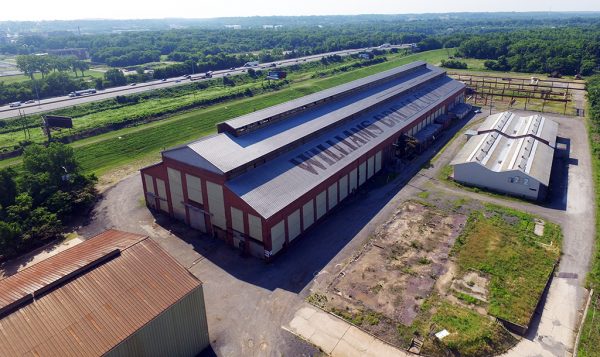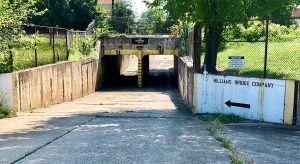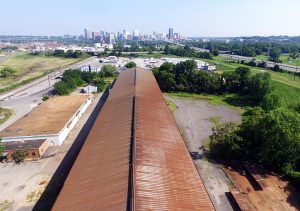With a buyer lined up, the family behind one of the largest and most visible manufacturing sites on the city’s Southside has a deal in the works to rezone the property and clear a path for potential redevelopment.
The sprawling and dormant Williams Bridge Co. complex at 700 E. Fourth and 1500 Goodes streets on the edge of Manchester is under contract with an undisclosed buyer, according to sources familiar with the pending deal.
The current owners of the 27-acre tract – family members of company namesake Frank Everett Williams Jr. – on June 1 filed a rezoning application with the city’s planning department to have the property rezoned from heavy industrial to the B-7 mixed-use zoning designation.
The family is working on the rezoning process with Lory Markham of Markham Planning and a broker with One South Commercial, according to the application. Walter Parks Architects has been secured as the pending project’s designer.
Put out of use a year ago, the Williams Bridge complex is comprised of six contiguous properties and parcels, most notably the 119,000-square-foot warehouse building that was constructed in 1918 and is highly visible from Interstate 95. It also holds about 8 acres of mostly undeveloped property at its southern border.
While no site-development plans have been filed, city records indicate the potential buyer is exploring options to convert the large warehousing facility into apartments.
The application states the rezoning would look to facilitate a “mixed-use industrial, commercial and residential development.”
“This rezoning request represents a unique opportunity to bring a vibrant mix of land uses to a large site close to downtown Richmond that would otherwise become underutilized,” the document states.
B-7 mixed-use zoning, which has been applied mainly in Scott’s Addition, encourages a broad range of uses, including residential, commercial and compatible industrial.
The designation also encourages denser development, and has been pivotal in helping transition former industrial sectors of the city into residential and commercial centers.
For nearly 100 years, Williams Bridge Co. used the large manufacturing and assembly buildings for the preparation and shipping of major bridge components via the adjacent rail network on the site.
At its peak, the facility employed hundreds of workers that resided in the Manchester, Blackwell and Oak Grove neighborhoods throughout the 20th century.
Eventually, the Manassas-based firm ceased operations on the site in 2017 and left it vacant – adding to a collection of defunct industrial space in the vicinity that’s too out of date for modern industrial reuse, but ripe for mixed-use redevelopment.
Frank Everett Williams III and Harold Arthur Williams, sons of the family that have been tasked with handling the company’s affairs, could not be reached for comment Tuesday afternoon.
The family does not own the 20,000-square-foot warehouse at 702 E. Fourth St. that roughly sits in the middle of the site.
Several former industrial sites around the Williams Bridge Co. complex have, or are preparing to be, repurposed into mixed-use developments.
Lynx Ventures, a new development firm launched this year by Bernard Harkless, Rick Gregory and his son John, is overseeing the $14.4 million addition of 104 residential units at New Manchester Flats at 915 E. Fourth St.
Meanwhile, Tom Papa of Fountainhead Properties is readying a 142,000-square-foot warehousing facility at 1125 Commerce Road to be converted into 100 income-based apartments.
With a buyer lined up, the family behind one of the largest and most visible manufacturing sites on the city’s Southside has a deal in the works to rezone the property and clear a path for potential redevelopment.
The sprawling and dormant Williams Bridge Co. complex at 700 E. Fourth and 1500 Goodes streets on the edge of Manchester is under contract with an undisclosed buyer, according to sources familiar with the pending deal.
The current owners of the 27-acre tract – family members of company namesake Frank Everett Williams Jr. – on June 1 filed a rezoning application with the city’s planning department to have the property rezoned from heavy industrial to the B-7 mixed-use zoning designation.
The family is working on the rezoning process with Lory Markham of Markham Planning and a broker with One South Commercial, according to the application. Walter Parks Architects has been secured as the pending project’s designer.
Put out of use a year ago, the Williams Bridge complex is comprised of six contiguous properties and parcels, most notably the 119,000-square-foot warehouse building that was constructed in 1918 and is highly visible from Interstate 95. It also holds about 8 acres of mostly undeveloped property at its southern border.
While no site-development plans have been filed, city records indicate the potential buyer is exploring options to convert the large warehousing facility into apartments.
The application states the rezoning would look to facilitate a “mixed-use industrial, commercial and residential development.”
“This rezoning request represents a unique opportunity to bring a vibrant mix of land uses to a large site close to downtown Richmond that would otherwise become underutilized,” the document states.
B-7 mixed-use zoning, which has been applied mainly in Scott’s Addition, encourages a broad range of uses, including residential, commercial and compatible industrial.
The designation also encourages denser development, and has been pivotal in helping transition former industrial sectors of the city into residential and commercial centers.
For nearly 100 years, Williams Bridge Co. used the large manufacturing and assembly buildings for the preparation and shipping of major bridge components via the adjacent rail network on the site.
At its peak, the facility employed hundreds of workers that resided in the Manchester, Blackwell and Oak Grove neighborhoods throughout the 20th century.
Eventually, the Manassas-based firm ceased operations on the site in 2017 and left it vacant – adding to a collection of defunct industrial space in the vicinity that’s too out of date for modern industrial reuse, but ripe for mixed-use redevelopment.
Frank Everett Williams III and Harold Arthur Williams, sons of the family that have been tasked with handling the company’s affairs, could not be reached for comment Tuesday afternoon.
The family does not own the 20,000-square-foot warehouse at 702 E. Fourth St. that roughly sits in the middle of the site.
Several former industrial sites around the Williams Bridge Co. complex have, or are preparing to be, repurposed into mixed-use developments.
Lynx Ventures, a new development firm launched this year by Bernard Harkless, Rick Gregory and his son John, is overseeing the $14.4 million addition of 104 residential units at New Manchester Flats at 915 E. Fourth St.
Meanwhile, Tom Papa of Fountainhead Properties is readying a 142,000-square-foot warehousing facility at 1125 Commerce Road to be converted into 100 income-based apartments.






That is such a cool building coming into Richmond, it will be nice to see it come alive with a mix used development in and around it. Can’t wait to see what becomes of this sight. Hope they keep the lettering on the roof.
Unfortunately there’s one big problem directly across the interstate from it: the waste water treatment plant. At times that area has a horrible aroma and the sight lines of looking out towards interstate 95 and the burning methane flame atop the treatment building is probably not going to be a big positive for a mixed use development. This piece of property is probably better left industrial.
This looks like a cool property and great old industrial buildings ready for renovation. But some of the drawbacks to development are being situated directly next to the waste treatment plant, surrounded by petroleum facilities and strip mines. Those factors should also be a concern for quality of life of the residents no matter who has been tasked with getting through planning or designing it.
I can tell you if you drive by that area at the right time its pretty unplesant, not sure how they work around it.
Not to mention being one way in and out that is a small tunnel, the don’t own the Tektonics buildings, active railroad and high speed corridor will limit additional grade crossings, and the flood wall circles it on three sides (wall and mostly berm) that has severe restrictions on land disturbance with a certain distance of it that will make any new structures very difficult.
Office/incubator for business like Tektonics would be the best use.